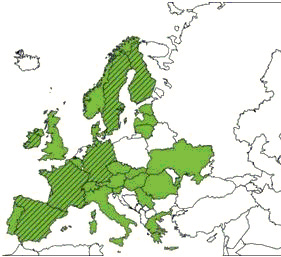Information for Europe’s bioeconomy

Comprehensive information on forest ecosystems and landscape changes are collected through national forest inventories. More efforts are needed to harmonise the data to make it comparable and easy to access. The project DIABOLO tackles Europe’s social, ecological and economic challenge, by providing such a platform of exchange.
The increasing competition for forest resources will necessitate new forest-related policies across different sectors. These policies demand relevant, harmonised, comprehensive, reliable and up-to-date information.

As a response to this challenge, the DIABOLO project brings together 33 partners from scientific institutions in 25 European countries, including experts in the fields of policy analysis, forest inventory and forest modelling, who have live linkages to European and national policy institutions and stakeholder networks.
Aims
DIABOLO’s aims are to
- strengthen the methods to produce more accurate, harmonised and timely information derived from forest inventories and monitoring systems, that can be fed into the EU information systems (SEIS, EFDAC)
- support the development of EU policies and international processes relying on consistent forest information and
- make innovative use of field-collected data and EC space-based applications of Earth observation.
Space data are great sources to monitor changes in land use and disturbances in European forests. Information on growing stock, biomass and carbon estimation will be harmonized using field and remote sensing data.
Innovative approaches
Five major innovations can be expected
- more effective interface between science and policy
- faster impact by sharing methods and techniques for harmonisation between 25 National Forest Inventories (NFIs)
- wider scope of NFIs
- improved timeliness in forest disturbance monitoring and
- better understanding of biomass supply dynamics and trade-offs between land-uses.
Consortium and collaboration
Klemens Schadauer, Alexandra Freudenschuß, Thomas Gschwantner and Ambros Berger from BFW are involved in three out of the six work packages. Their contributions are to map the demands for forest data of policy makers at different political levels and key forest managers, to harmonize growing stock volume and to develop models for sustainable forest ecosystems.
New methodologies developed by the different work packages will support the development of a strategy to improve knowledge communication and information exchange.
A Workshop on “Policy needs for and provision of forest information for policy making and practice in Europe: state of the art and the way forward” was organized at BFW from 19th to 20th of September 2016.
This project has received funding from the European Union’s Horizon 2020 research and innovation programme under grant agreement No 633464.
Project duration: 1.3.2015–28.2.2019.
Coordinator: Natural Resources Institute Finland (Luke)
Links
DIABOLO website
European National Forest Inventory Network
